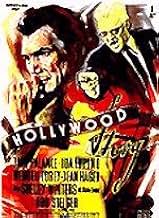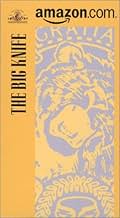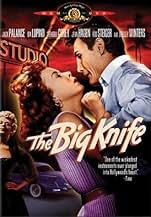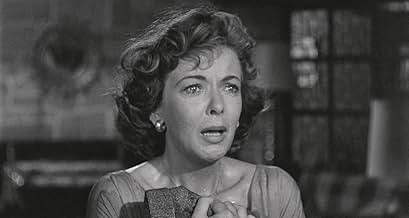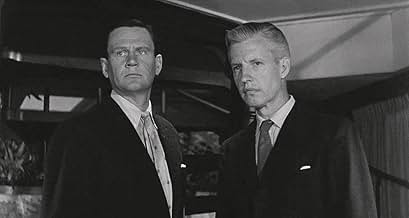IMDb RATING
6.8/10
4.6K
YOUR RATING
Hollywood actor Charles Castle is pressured by his studio boss into a criminal cover-up to protect his valuable career.Hollywood actor Charles Castle is pressured by his studio boss into a criminal cover-up to protect his valuable career.Hollywood actor Charles Castle is pressured by his studio boss into a criminal cover-up to protect his valuable career.
- Awards
- 1 win & 2 nominations total
Michael Winkelman
- Billy Castle
- (as Mike Winkelman)
Shelley Winters
- Dixie Evans
- (as Miss Shelley Winters)
Richard Boone
- Narrator
- (voice)
- (uncredited)
Nick Cravat
- Nick
- (uncredited)
Robert Emhardt
- Bit Part
- (uncredited)
Michael Fox
- Prize Fight Announcer
- (uncredited)
Paula Kyle
- Party Guest
- (uncredited)
- Director
- Writers
- All cast & crew
- Production, box office & more at IMDbPro
Featured reviews
"The Big Knife" is really a stage play recorded on film. It's a Hollywood soap opera that features a lot of good actors eating the scenery. Rod Steiger and Everett Sloan are great as the monstrous studio honcho and weaselly agent, respectively. Jack Palance is a competent actor but was woefully miscast as the sensitive, tortured matinée idol -- nobody would ever confuse Palance with a matinée idol. Nevertheless, he does an adequate job.
The power of the studio system in the '50s is well depicted, if a bit overwrought. Steiger's performance is particularly delicious as his toweringly self-centered character cries, wheedles, and intimidates his underlings into doing what he wants.
The movie is showing its age but its excesses, especially its colorful language, are a lot of fun. Recommended, 7 out of 10.
The power of the studio system in the '50s is well depicted, if a bit overwrought. Steiger's performance is particularly delicious as his toweringly self-centered character cries, wheedles, and intimidates his underlings into doing what he wants.
The movie is showing its age but its excesses, especially its colorful language, are a lot of fun. Recommended, 7 out of 10.
Bel Air. The well-manicured area of LA where the successful actors, producers and directors in Hollywood live. So says the opening voice- over.
Jack Palance, not the obvious choice for a leading man (& director Robert Aldrich's lame excuse for the film's box office failure) has never been better, nor has he had such a meaty role. His portrayal of pent-up anger and frustration is powerful yet still believable.
He's the washed up star who's unravelling at the seams, wrestling with a dark secret and Rod Steiger, complete with blonde hairdo as his studio manager who is out to keep a lid on bad publicity at all costs. He will stop at nothing at getting a new contract signed.
Ida Lupino is also extremely fine as Charles Castle's (Palance) wife. Their marriage is on the rocks and she pleads that Charles takes the rest that he desperately needs and to not sign. She won't go back to him otherwise. There's good support from tease Shelley Winters and as Charles' agent, Everett Sloane plus Wendell Corey as a ruthless producer.
Much of the action takes place in the Castle's vast living room, nodding to the theatrics of the original play by Clifford Odets.
This is a slow-burning, quite talky, intelligent character-led and well scripted study of Hollywood's mechanics - its layers of people. Not as flashy or melodramatic as some and certainly not as well known, but still directed with surety and skill. Today's viewer will have to adjust to the pace and style but that's easy and the rewards to those attuned can be high.
There's enough depth to the material for a second viewing, which helps bring out the characters even more vividly.
Jack Palance, not the obvious choice for a leading man (& director Robert Aldrich's lame excuse for the film's box office failure) has never been better, nor has he had such a meaty role. His portrayal of pent-up anger and frustration is powerful yet still believable.
He's the washed up star who's unravelling at the seams, wrestling with a dark secret and Rod Steiger, complete with blonde hairdo as his studio manager who is out to keep a lid on bad publicity at all costs. He will stop at nothing at getting a new contract signed.
Ida Lupino is also extremely fine as Charles Castle's (Palance) wife. Their marriage is on the rocks and she pleads that Charles takes the rest that he desperately needs and to not sign. She won't go back to him otherwise. There's good support from tease Shelley Winters and as Charles' agent, Everett Sloane plus Wendell Corey as a ruthless producer.
Much of the action takes place in the Castle's vast living room, nodding to the theatrics of the original play by Clifford Odets.
This is a slow-burning, quite talky, intelligent character-led and well scripted study of Hollywood's mechanics - its layers of people. Not as flashy or melodramatic as some and certainly not as well known, but still directed with surety and skill. Today's viewer will have to adjust to the pace and style but that's easy and the rewards to those attuned can be high.
There's enough depth to the material for a second viewing, which helps bring out the characters even more vividly.
"The Big Knife" caused a sensation when it came out. After all, no one in his right mind would dare to criticize the movie industry, after all, it was the studio and its ruthless executives that were exposed as the bad guys, even at the time where the old studio system was disappearing.
Clifford Odets wrote the original play, which under Robert Aldrich direction doesn't translate to the screen because it feels claustrophobic in many aspects. The movie treatment was by James Poe, did not make the material come alive because of the theatricality of the source.
Charles Castle, an actor working in Hollywood, is about to commit himself to a renewal of his contract to a major studio. That means another seven years of his life working in whatever pictures the higher ups have in store for him. It couldn't come at a worse time; his wife, Marion, who evidently hasn't a good relation with Charles, is fed up with the idea of staying in Bel Air. Marion pleads with him to give up the movie business so they could have a normal life bringing up their young son.
Castle has had his share of adventures in Hollywood, something that Marion is aware of. In addition to that, he has a dark secret, something that involved a terrible accident for which his publicist has taken the blame and has even serve time in jail. A couple of women are also in the picture, threatening Charles' marriage.
To make matters worse, Charles is visited by the head of the studio, Stanley Hoff, who has brought his assistant, the oily Smiley Coy, to help him convince Castle to sign the contract. Charles Castle is finally defeated at the game as Stanley plays his cards right since he has the upper hand. The result is a bitter loss for the actor, who sees no way out of the situation at hand.
Jack Palance, who, up to this film, had only minor parts, rose to the challenge of playing Charles Castle, who in a way, he had the background, having been a boxer, to play. His work, although a bit unsure, was a revelation to the movie going public at the time. Ida Lupino, an excellent actress, is probably the best thing in the picture. Rod Steiger shows up as the studio head Stanley Hoff, a man that knows well his opponent's weaknesses and uses all in his power to get his way. Wendell Corey, in a small part, also does good work. Jean Hagen and Shelley Winters also contribute to the film.
Ernest Lazlo's cinematography works well, as does the musical score by Frank DeVol. Robert Aldrich, a man with a lot of experience in the business, was a natural choice to undertake the direction of this picture. His only problem was a basic one, how to open the play to cinematic terms.
Clifford Odets wrote the original play, which under Robert Aldrich direction doesn't translate to the screen because it feels claustrophobic in many aspects. The movie treatment was by James Poe, did not make the material come alive because of the theatricality of the source.
Charles Castle, an actor working in Hollywood, is about to commit himself to a renewal of his contract to a major studio. That means another seven years of his life working in whatever pictures the higher ups have in store for him. It couldn't come at a worse time; his wife, Marion, who evidently hasn't a good relation with Charles, is fed up with the idea of staying in Bel Air. Marion pleads with him to give up the movie business so they could have a normal life bringing up their young son.
Castle has had his share of adventures in Hollywood, something that Marion is aware of. In addition to that, he has a dark secret, something that involved a terrible accident for which his publicist has taken the blame and has even serve time in jail. A couple of women are also in the picture, threatening Charles' marriage.
To make matters worse, Charles is visited by the head of the studio, Stanley Hoff, who has brought his assistant, the oily Smiley Coy, to help him convince Castle to sign the contract. Charles Castle is finally defeated at the game as Stanley plays his cards right since he has the upper hand. The result is a bitter loss for the actor, who sees no way out of the situation at hand.
Jack Palance, who, up to this film, had only minor parts, rose to the challenge of playing Charles Castle, who in a way, he had the background, having been a boxer, to play. His work, although a bit unsure, was a revelation to the movie going public at the time. Ida Lupino, an excellent actress, is probably the best thing in the picture. Rod Steiger shows up as the studio head Stanley Hoff, a man that knows well his opponent's weaknesses and uses all in his power to get his way. Wendell Corey, in a small part, also does good work. Jean Hagen and Shelley Winters also contribute to the film.
Ernest Lazlo's cinematography works well, as does the musical score by Frank DeVol. Robert Aldrich, a man with a lot of experience in the business, was a natural choice to undertake the direction of this picture. His only problem was a basic one, how to open the play to cinematic terms.
A truly memorable film with tough and rugged, but hardly handsome, Jack Palance as Charlie Castle playing of all people an actor who's always playing matinée Idols and great lovers. As Charlie's boss and studio owner Stanley Hoff,Rod Steiger, says of him throughout the film :"He makes all the women of America heart's swoon". "The Big Knife" is worth the price of admission just to see how and if director Robert Aldrich can pull it off and make the film both entertaining and believable.
You see Charlie is getting tired of playing all those roles over the years as a heart throb to the women of America and wants to get out of his contract with the Hoff Studios and go independent; That was a big thing for actors back in the 1950's. Charlie wan't to do films that are worthy of his extraordinary talents as a serious and Shakespearian actor. It's that Charlie's off the wall and possessive boss Stanley Hoff, the Big Knife, doesn't want his meal ticket to leave and take his fans with him! So Stanley rolls out the heavy artillery and plays his trump card. It seems that Charlie has a dark secret that the studio has been covering up for years and if Charlie leaves that secret won't be a secret any more! Get It Charlie!
The film "The Big Knife" can really be described as one of the most multi storied soap operas ever put on film with the audience needing score cards just to keep up with the story and even then they'll get lost. Whoever coined the phrase "Seeing is believing" must have based it on the the incredible performance of Rod Steiger's Stanley Hoff which goes from a Saturday Night Live impersonation shtick of a big Hollywood producer to an Oscar winning interpretation of Hamlet all at the same time! It's really incredible to watch and believe what your seeing in Steiger's over the top performance.
And Jack Palance, determined not to be shown up his co-star, really did pull it off in him Playing a role so out of character and yet evoking real and genuine sympathy from the audience that he should have, but didn't, won the 1955 Academy Award for best actor hands down! As the tortured soul with a dark past who only wanted to do Art Films and get away from playing debonair and charming movie parts that make women go ape all over him. In the end of the film when Palance went all out, or was it underwater, in the final few minutes of the movie he was so convincing that I just couldn't keep the tears from rolling down my cheeks!
No matter how much people criticize Robert Aldrich's "The Big Knife" and with good justification this is one movie where you can really say that the acting actually overwhelmed the script!
You see Charlie is getting tired of playing all those roles over the years as a heart throb to the women of America and wants to get out of his contract with the Hoff Studios and go independent; That was a big thing for actors back in the 1950's. Charlie wan't to do films that are worthy of his extraordinary talents as a serious and Shakespearian actor. It's that Charlie's off the wall and possessive boss Stanley Hoff, the Big Knife, doesn't want his meal ticket to leave and take his fans with him! So Stanley rolls out the heavy artillery and plays his trump card. It seems that Charlie has a dark secret that the studio has been covering up for years and if Charlie leaves that secret won't be a secret any more! Get It Charlie!
The film "The Big Knife" can really be described as one of the most multi storied soap operas ever put on film with the audience needing score cards just to keep up with the story and even then they'll get lost. Whoever coined the phrase "Seeing is believing" must have based it on the the incredible performance of Rod Steiger's Stanley Hoff which goes from a Saturday Night Live impersonation shtick of a big Hollywood producer to an Oscar winning interpretation of Hamlet all at the same time! It's really incredible to watch and believe what your seeing in Steiger's over the top performance.
And Jack Palance, determined not to be shown up his co-star, really did pull it off in him Playing a role so out of character and yet evoking real and genuine sympathy from the audience that he should have, but didn't, won the 1955 Academy Award for best actor hands down! As the tortured soul with a dark past who only wanted to do Art Films and get away from playing debonair and charming movie parts that make women go ape all over him. In the end of the film when Palance went all out, or was it underwater, in the final few minutes of the movie he was so convincing that I just couldn't keep the tears from rolling down my cheeks!
No matter how much people criticize Robert Aldrich's "The Big Knife" and with good justification this is one movie where you can really say that the acting actually overwhelmed the script!
Unless you understand that The Big Knife was Clifford Odets's one finger salute to Hollywood and its mores, you will not understand the film at all. Odets after some bad times in tinseltown went back to his first love which was the theater and wrote this play which ran for 109 performances in the 1949 season on Broadway.
In the lead roles of actor Charlie Castle and producer Marcus Hoff, Odets cast a couple of guys who were having difficulty finding employment in Hollywood at that time as well, kindred spirits from the Group Theater back in the day, John Garfield and J. Edward Bromberg. Garfield who certainly could bring his own life into the part plays Odets himself who had as tempestuous personal life as his creation Charlie Castle. He feels starved creatively because of the junk he's been doing in Hollywood, not the stuff of social significance that Odets did back Group Theater days.
Jack Palance plays Castle in the film and while he does justice to the part I only wish John Garfield had lived to do the screen version of what he created. He had an unceasing rebellion against Warner Brothers for the stereotypical tough guys parts he was being cast in. But just after he broke free came the blacklist.
Rod Steiger is malevolence itself as the producer whom I believe was based on Louis B. Mayer. Odets dealt with him through his then wife Luise Rainer over at MGM. Mayer was not liked even by his fellow studio moguls and he had been toppled in a studio power play at MGM a few years earlier. Had he still been in charge at MGM, I'm willing to bet The Big Knife might never have been made even as an independent film with a United Artists release.
Director Robert Aldrich filled out the rest of the cast with familiar Hollywood names like Ida Lupino as Palance's estranged wife, Everett Sloane as his long suffering agent, Wendell Corey in a role that has to be modeled on MGM's fixer who knew where all the bodies were buried Eddie Mannix, Shelley Winters as the bimbo like starlet who can put an end to Palance's career and Ilka Chase as a Hedda Hopper like columnist who is the self appointed keeper of the Hollywood morals. Chase's scenes are at the beginning of the film and she really has the columnist character dead on.
On stage the entire play is set in the living room of the Palance/Lupino Hollywood style mansion. Like the house in Long Day's Journey Into Night, the opulent living room becomes a character itself, showing the velvet and comfortable trap that Palance is in and why he just can't give up all this comfort, even for the art that used to motivate him.
Odets might have done better had someone else a little more dispassionate had written this based on his memoirs. The Big Knife gets a little too personal at times. And it never quite loses the stage origin even with a few scenes away from the house. But the acting his first rate from a first rate cast. I'd watch The Big Knife as a look into the mind of Clifford Odets.
In the lead roles of actor Charlie Castle and producer Marcus Hoff, Odets cast a couple of guys who were having difficulty finding employment in Hollywood at that time as well, kindred spirits from the Group Theater back in the day, John Garfield and J. Edward Bromberg. Garfield who certainly could bring his own life into the part plays Odets himself who had as tempestuous personal life as his creation Charlie Castle. He feels starved creatively because of the junk he's been doing in Hollywood, not the stuff of social significance that Odets did back Group Theater days.
Jack Palance plays Castle in the film and while he does justice to the part I only wish John Garfield had lived to do the screen version of what he created. He had an unceasing rebellion against Warner Brothers for the stereotypical tough guys parts he was being cast in. But just after he broke free came the blacklist.
Rod Steiger is malevolence itself as the producer whom I believe was based on Louis B. Mayer. Odets dealt with him through his then wife Luise Rainer over at MGM. Mayer was not liked even by his fellow studio moguls and he had been toppled in a studio power play at MGM a few years earlier. Had he still been in charge at MGM, I'm willing to bet The Big Knife might never have been made even as an independent film with a United Artists release.
Director Robert Aldrich filled out the rest of the cast with familiar Hollywood names like Ida Lupino as Palance's estranged wife, Everett Sloane as his long suffering agent, Wendell Corey in a role that has to be modeled on MGM's fixer who knew where all the bodies were buried Eddie Mannix, Shelley Winters as the bimbo like starlet who can put an end to Palance's career and Ilka Chase as a Hedda Hopper like columnist who is the self appointed keeper of the Hollywood morals. Chase's scenes are at the beginning of the film and she really has the columnist character dead on.
On stage the entire play is set in the living room of the Palance/Lupino Hollywood style mansion. Like the house in Long Day's Journey Into Night, the opulent living room becomes a character itself, showing the velvet and comfortable trap that Palance is in and why he just can't give up all this comfort, even for the art that used to motivate him.
Odets might have done better had someone else a little more dispassionate had written this based on his memoirs. The Big Knife gets a little too personal at times. And it never quite loses the stage origin even with a few scenes away from the house. But the acting his first rate from a first rate cast. I'd watch The Big Knife as a look into the mind of Clifford Odets.
Did you know
- TriviaBecause of its vitriolic take on Tinseltown, this was unsurprisingly turned down by all the major studios in Hollywood. It eventually found a home at United Artists.
- GoofsThe camera and operator are visibly reflected in one scene in the living room.
- Quotes
Smiley Coy: A woman with six martinis can ruin a city.
- Crazy creditsIn the opening credits: Upholstered furniture by Martin/ Brattrud.
- ConnectionsFeatured in Les dossiers de l'écran: Les coulisses du cinéma (1970)
- How long is The Big Knife?Powered by Alexa
Details
Box office
- Budget
- $423,000 (estimated)
- Runtime
- 1h 51m(111 min)
- Color
- Aspect ratio
- 1.85 : 1
Contribute to this page
Suggest an edit or add missing content


